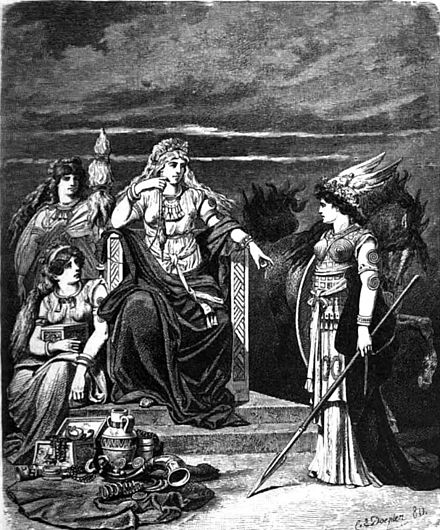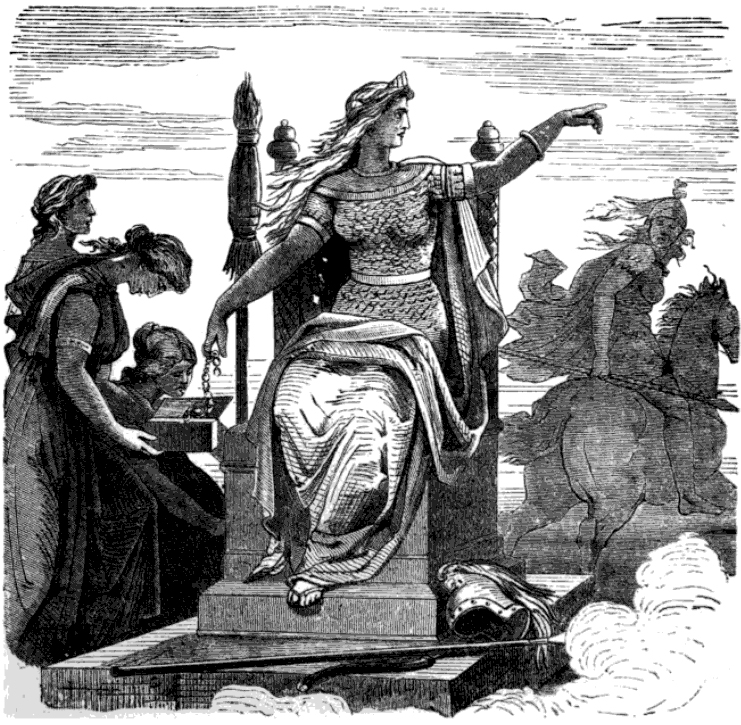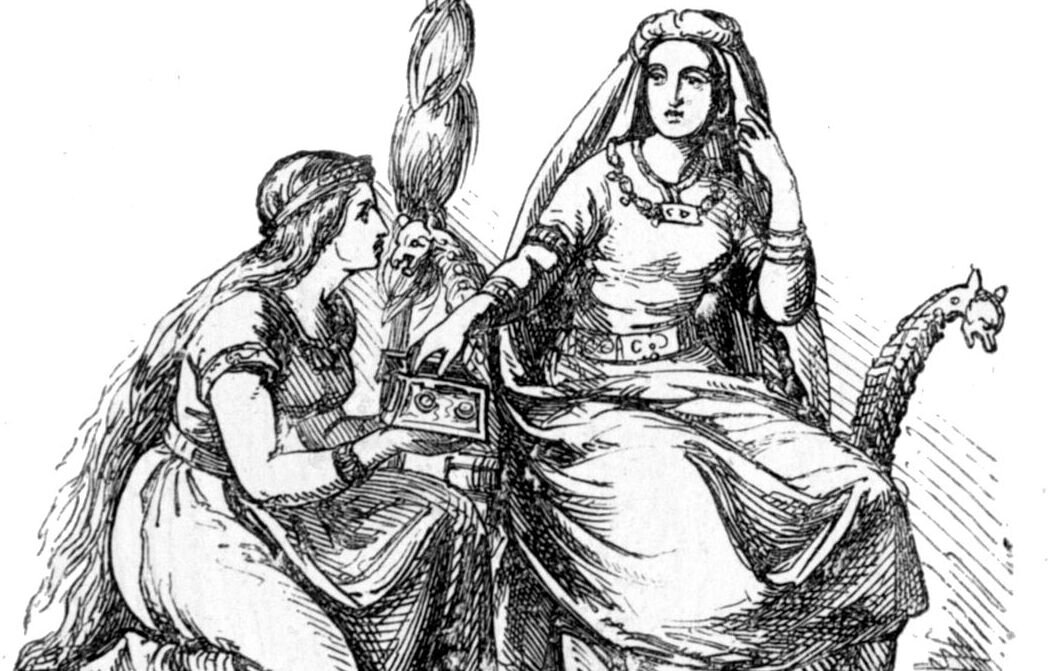Frigg, the Queen of Asgard, was a Vanir (from Vanaheim) and the highest-ranking Æsir goddess. Although her husband was the principal god Odin, her home was described as a hall in a marshy region called Fensalir. The Prose Edda tells us her father was Fjörgynn. She has three sons with Odin: Baldr (also known as Baldur or Balder), Hermod, and Hodr.
Frigg: Pronunciation and meaning
Frigg (pronunciation: “frig”) is known as Frīja (Old High German) in Germanic mythology, Frēa in Langobardc, Frīg in Old English, and Frī in Old Saxon.
All these derivations originate from the Proto-Germanic theonym Frijjō, meaning “Beloved” or “Free.”
Who Was Frigg in Norse mythology?
Frigg was the mother of the “gleaming god” of light Baldr, Hermod (the messenger of the gods), and the blind god Hodr (twin of Baldr). Thor is not considered Frigg’s son, although she did raise him.
Frigg is associated with fertility and marriage, and she certainly seems to be a loving mother, although some stories depict her as not being a faithful wife to Odin. There are extenuating circumstances surrounding these events, as we will read later.
Frigg’s Powers
The powers most frequently attributed to Frig were her intelligence, soothsaying, and prophecy. She was also often strongly associated with marriage, childbirth, and motherhood.
In Gylfaginning, the first chapter of the Prose Edda, Gangleri (one of Odin’s nicknames or also possibly King Gylfi in disguise – the earliest recorded Scandinavian king) asks Hárr (or Jafnhárr, a member of the “Mysterious Three” who guards Valhalla) about the Ásynjur, a term for Norse goddesses. Hárr or (High) says that the “highest” is Frigg and that only Freyja “is highest in rank next to her.” He describes Frigg’s Hall in Fensalir as “very splendid.”
Hárr also says: “Frigg, methinks, is wise in all fates” and that she is the foremost among the Ásynjur, the female members of the Æsir. She and Odin are the only ones permitted to sit on the high seat of “Hlidskjalf” and preside over the universe from there.
The Gylfaginning prologue says Frigg and Odin “had the gift of prophecy.”
Does Frigg Have a Particular Object?
Frigg is mentioned in connection to other Ásynjur, such as her handmaiden Fulla who carries Frigg’s ashen box and “looks after her footwear and shares her secrets.”
In section 49 of Gylfaginning, when Hermod (or Hermóðr) arranged the return of Baldr from Hel, Nanna (Baldr’s widow who had gone to Hel as well after dying of grief after his death) and Hermóðr sent a linen robe to Frigg and a ring to Fulla.

Frigg’s Symbols
The main symbols associated with Frigg’s are the sky and the full moon.
Other objects that appear in images of her are mistletoe (after Loki’s use of it to kill Baldr), a spinning wheel, a spindle, and a stork (the bird related to the bringing of children).
Which Animal is Associated with Frigg?
A quote about Frigg in chapter 19 of Skáldskaparmál in the Prose Edda revealed that she could take the form of a falcon:
Queen of Æsir and Asyniur, of Fulla and falcon form and Fensalir.
It was almost certainly Frigg who Loki convinced to lend him her falcon disguise when he wished to scout Jotunheim.
Some sources name her spirit animal a horned owl symbolizing great wisdom. Waterfowl are sometimes associated with her due to her residence in the marshes of Fensalir. There is also mention of goats and, as we have seen previously, a stork.
Which Rune is Associated with Frigg?
According to D. Jason Cooper, who wrote Using the Runes, Frigg had close ties to the birch tree, whose rune is Boerc.
In the Prose Edda, there is a mention of Frigg as follows:
She knows the fates of all men, though she speaks no prophecy.
Frigga and the Birch – Hearth Moon Rising’s Blog
No special weapon is associated with Frigg.
Are Frigg and Freyja the Same Person?
There are conflicting sources over whether Frigg and Freyja were the same person.
The poem Lokasenna describes how Freyja defends Frigg from Loki, telling him she practices seidr (soothsaying), knows everybody’s destiny, and is more powerful than might be apparent.
sites.psu.edu says that Frigg was an exact alias of Freya, and the only difference was that Frigg called Odin “Odin,” and Freya called him “Od.”
worldhistory.org points out that Frigg has her own realm called Fensalir (location unknown), while Freyja is more associated with Asgard and Vanaheim. However, Freyja has an afterlife realm called Folkvangr (“field of the people”), which is remarkably similar to Vanaheim.
Old Norse and High German closely relate Frigg to handmaiden Fulla and other goddesses. The gentle Lofn, authorized by the pantheon to arrange marriages, and Hlín, the protector and Frigg’s “sweet friend” (Poetic Edda poem Völuspál), may be aliases of Frigg.

Was Frigg Unfaithful to Odin?
In book one of Gesta Danorum (“Deeds of the Danes”), the 12th-century work by Saxo Grammaticus, Odin left Frigg alone while he left to undergo a journey. Frigg cuckolded Odin with a slave who she convinced to help her ransack a golden statue of her husband.
Odin discovered the plot on his return and exiled himself in shame for having a wife who would do something like that.
In the Ynglinga Saga, the first book of Heimskringla, Odin left Frigg alone again and appointed his brothers Vili and Vé to take charge while he was gone. He was absent for so long that the Æsir decided he was not coming back and started to divide his kingdom between them. This agreement also included conjugal rights to his wife, whom they shared. Odin presently returned and retook possession of his wife.
In Lokasenna (the flyting of Loki’s), Loki mocks Frigg:
Shut up, Frigg! You are Fjörgynn’s daughter
and have ever been most eager for men…
Odin’s Unfaithfulness
His son, Thor, is the best example of Odin being unfaithful to his wife. Fjörgyn (Jörð in Old Norse; translation: “earth”) is a personification of the earth according to Norse mythology and the mother of Thor.
In Lokasenna, Thor is named as Jarðar burr (“son of Jörð”).
There are attestations of Jörð being Thor’s mother in the Prose Edda books Skáldskaparmál and Gylfaginning.
Section 10 of Gylfaginning says that the earth was Odin’s wife and daughter, and she gave him his first son, Asa-Thor.
Does Frigg survive Ragnarök?
No. Every Norse god dies during Ragnarök except Hoenir, Magni, Modi, Njord, Vidar, Vali, and the daughter of Sol.
According to the Prose Edda, two humans, the male Lifthrasir and the woman Lif hid in a place called Hoddmimir’s Holt and were the only survivors.
Is Friday named after Freya or Frigg?
The English weekday name Friday means “Frigg’s Day.” The word comes from Frīġedæġ, meaning “day of Frig” in Old English.
It shares the exact linguistic derivation as Frīadei from Old Frisian and Frîatac in Old High German, while Old Norse took Frîatac and turned it into Frjádagr. All these terms originate from the late Proto-Germanic word Frijjōdag (‘Day of Frijjō’).
Incidentally, the fear of Friday the 13th is called “friggatriskaidekaphobia.”

